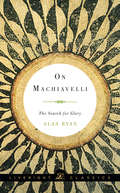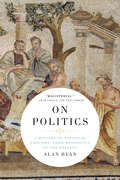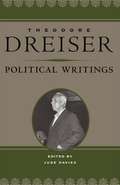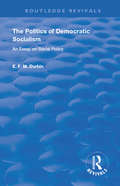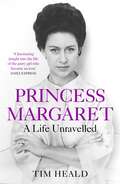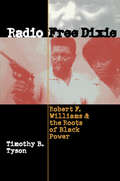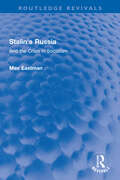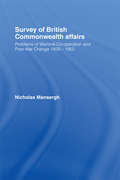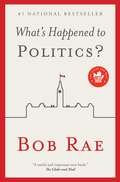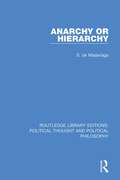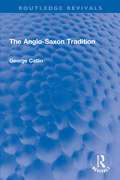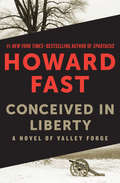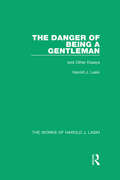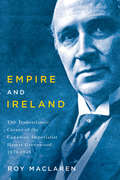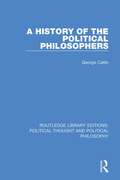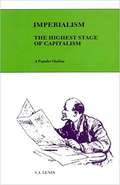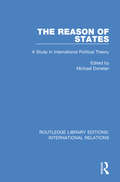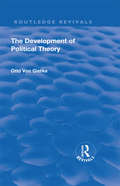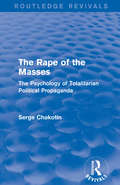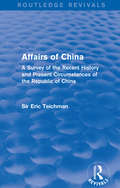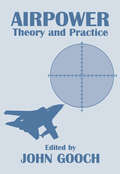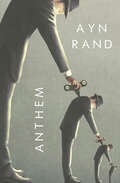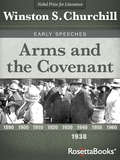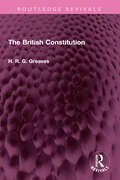- Table View
- List View
On Machiavelli: The Search for Glory (Liveright Classics)
by Alan RyanAn essential, comprehensive, and accessible guide to the life and works of Machiavelli. In On Machiavelli: The Search for Glory, Alan Ryan illuminates the political and philosophical complexities of the often-reviled godfather of realpolitik. Thought by some to be the founder of Italian nationalism, regarded by others to be a reviver of the Roman Republic as a model for the modern Western world, Machiavelli remains a contentious figure. Often outraging popular opinion with his insistence on the amoral nature of power, Machiavelli eschewed the world as it ought to be in favor of a forthright appraisal of the one that is. Perhaps more than any other thinker, Machiavelli has suffered from being taken out of context, and Ryan places him squarely within his own time and the politics of a Renaissance Italy riven by near-constant warfare among rival city-states and the papacy. A well-educated son of Florence, Machiavelli was originally in charge of the Florentine Republic's militia, but in 1512 the city fell to papal forces led by Cardinal Giovanni de Medici, who thus restored the Medici family to power. Machiavelli was accused of conspiracy, imprisoned, tortured, and eventually exiled from his beloved Florence, and it was during this period that he produced his most famous works. While attempting to ingratiate himself to the Medicis, the historically minded Machiavelli looked to the imperial ambitions and past glories of the Roman Republic as a contrast to the perceived failures of his contemporaries. For Machiavelli, the hunger for power and glory was inextricable from human nature, and any serious attempt to rule must take this into account. In his revolutionary The Prince and Discourses--both excerpted here--Machiavelli created the first truly modern analysis of power.
On Politics: From Herodotus to the Present (Liveright Classics Ser. #0)
by Alan RyanThree decades in the making, one of the most ambitious and comprehensive histories of political philosophy in nearly a century. Both a history and an examination of human thought and behavior spanning three thousand years, On Politics thrillingly traces the origins of political philosophy from the ancient Greeks to Machiavelli in Book I and from Hobbes to the present age in Book II. Whether examining Lord Acton's dictum that "absolute power corrupts absolutely" or explicating John Stuart Mill's contention that it is "better to be a human dissatisfied than a pig satisfied," Alan Ryan evokes the lives and minds of our greatest thinkers in a way that makes reading about them a transcendent experience. Whether writing about Plato or Augustine, de Toqueville or Thomas Jefferson, Ryan brings a wisdom to his text that illuminates John Dewey's belief that the role of philosophy is less to see truth than to enhance experience. With this unparalleled tour de force, Ryan emerges in his own right as one of the most influential political philosophers of our time.
Political Writings
by Theodore DreiserTheodore Dreiser staked his reputation on fearless expression in his fiction, but he never was more outspoken than when writing about American politics. Spanning a period in American history from the Progressive Era to the advent of the Cold War, this generous volume collects Dreiser's most important political writings from his journalism, broadsides, speeches, private papers, and long out-of-print nonfiction books. Touching on the Great Depression, the New Deal, and both World Wars as well as Soviet Russia and the persecution of Jews in Nazi Germany, these writings exemplify Dreiser's candor and his penchant for championing the defenseless and railing against corruption. The works also navigate historical terrain with prescient observations on topics such as religion, civil rights, national responsibility, individual ethics, global relations, and censorship that remain relevant to a contemporary audience.
The Politics of Democratic Socialism: An Essay on Social Policy (Routledge Revivals)
by E. F. DurbinPublished in 1940, The Politics of Democratic Socialism covers a number of subjects including social psychology, economic history, Marxist doctrine and the academic subject of politics to name a few. With Durbin’s compulsion to explain and defend the views about social and economic policy that he believes to be true, makes this an interesting, insightful and educational book for those who want to learn about socialism and democracy.
Princess Margaret: A Life Unravelled
by Tim HealdElegant and sophisticated biography of Princess Margaret, the controversial sister of Queen Elizabeth II, the Princess Diana of her day'A fascinating insight into the life of the party girl who became an icon in postwar Britain' DAILY EXPRESS'She was a witty, intelligent, stimulating companion - happily Tim Heald captures all these qualities in his admirably well-balanced biography' LITERARY REVIEWThe almost universal conception is that the life of Princess Margaret (1930-2002) was a tragic failure, a history of unfulfilment.Tim Heald's vivid and elegant biography portrays a woman who was beautiful and sexually alluring - even more so than Princess Diana, years later - and whose reputation for naughtiness co-existed with the glamour. The mythology is that Margaret's life was 'ruined' by her not being allowed to marry the one true love of her life - Group Captain Peter Townsend - and that therefore her marriage to Lord Snowdon and her well-attested relationships with Roddy Llewellyn and others were mere consolation prizes. Margaret's often exotic personal life in places like Mustique is a key part of her story. The author has had extraordinary help from those closest to Princess Margaret, including her family (Lord Snowdon and her son, Lord Linley), as well as three of her private secretaries and many of her ladies in waiting. These individuals have not talked to any previous biographer. He has also had the Queen's permission to use the royal archives.Heald asks why one of the most famous and loved little girls in the world, who became a juvenile wartime sweetheart, ended her life a sad wheelchair-bound figure, publicly reviled and ignored. This is a story of a life in which the private and the public seemed permanently in conflict. The biography is packed with good stories. Princess Margaret was never ignored; what she said and did has been remembered and recounted to Tim Heald.
Princess Margaret: A Life Unravelled
by Tim HealdElegant and sophisticated biography of Princess Margaret, the controversial sister of Queen Elizabeth II, the Princess Diana of her day'A fascinating insight into the life of the party girl who became an icon in postwar Britain' DAILY EXPRESS'She was a witty, intelligent, stimulating companion - happily Tim Heald captures all these qualities in his admirably well-balanced biography' LITERARY REVIEWThe almost universal conception is that the life of Princess Margaret (1930-2002) was a tragic failure, a history of unfulfilment.Tim Heald's vivid and elegant biography portrays a woman who was beautiful and sexually alluring - even more so than Princess Diana, years later - and whose reputation for naughtiness co-existed with the glamour. The mythology is that Margaret's life was 'ruined' by her not being allowed to marry the one true love of her life - Group Captain Peter Townsend - and that therefore her marriage to Lord Snowdon and her well-attested relationships with Roddy Llewellyn and others were mere consolation prizes. Margaret's often exotic personal life in places like Mustique is a key part of her story. The author has had extraordinary help from those closest to Princess Margaret, including her family (Lord Snowdon and her son, Lord Linley), as well as three of her private secretaries and many of her ladies in waiting. These individuals have not talked to any previous biographer. He has also had the Queen's permission to use the royal archives.Heald asks why one of the most famous and loved little girls in the world, who became a juvenile wartime sweetheart, ended her life a sad wheelchair-bound figure, publicly reviled and ignored. This is a story of a life in which the private and the public seemed permanently in conflict. The biography is packed with good stories. Princess Margaret was never ignored; what she said and did has been remembered and recounted to Tim Heald.
Radio Free Dixie
by Timothy B. TysonThis book tells the remarkable story of Robert F. Williams--one of the most influential black activists of the generation that toppled Jim Crow and forever altered the arc of American history. In the late 1950s, as president of the Monroe, North Carolina, branch of the NAACP, Williams and his followers used machine guns, dynamite, and Molotov cocktails to confront Klan terrorists. Advocating "armed self-reliance" by blacks, Williams challenged not only white supremacists but also Martin Luther King Jr. and the civil rights establishment. Forced to flee during the 1960s to Cuba--where he broadcast "Radio Free Dixie," a program of black politics and music that could be heard as far away as Los Angeles and New York City--and then China, Williams remained a controversial figure for the rest of his life. Historians have customarily portrayed the civil rights movement as a nonviolent call on America's conscience--and the subsequent rise of Black Power as a violent repudiation of the civil rights dream. But Radio Free Dixie reveals that both movements grew out of the same soil, confronted the same predicaments, and reflected the same quest for African American freedom. As Robert Williams's story demonstrates, independent black political action, black cultural pride, and armed self-reliance operated in the South in tension and in tandem with legal efforts and nonviolent protest."Stunning. . . . Radio Free Dixie presents an engaging portrait of one man's continuous struggle to resist political and social oppression."--Emerge"[A] radiant biography. . . . Tyson is that rarest of writers: a successful scholar who can actually tell a compelling story in clear, even handsome language."--Village Voice Literary Supplement"Tyson's firecracker text crackles with brilliant and lasting images of black life . . . across the South in the '40s, '50s and '60s. . . . Tyson successfully portrays Williams as a troubled visionary, a strong, stubborn and imperfect man, one who greatly influenced what became the Black Power Movement and its young leaders."--Publishers WeeklyThis book tells the riveting story of controversial black activist Robert F. Williams (1925-1996). In the late 1950s, as president of the Monroe, North Carolina, NAACP, Williams organized armed resistance to KKK terrorists--in the process challenging not only white supremacists but also Martin Luther King Jr. and the civil rights establishment. As Radio Free Dixie reveals, however, the civil rights movement and the Black Power movement grew out of the same soil, confronted the same predicaments, and were much closer than traditional portrayals suggest. In the civil rights-era South, independent black politics, black cultural pride, and "armed self-reliance" operated in tension and in tandem with legal efforts and nonviolent protests in the quest for African American freedom. -->
Stalin's Russia: And the Crisis in Socialism (Routledge Revivals)
by Max EastmanFirst published in 1940, Stalin’s Russia is a close study of the development of the Stalinist regime and the flaws in socialist doctrine that made it possible. The book examines the contrasts between the "free and equal" society heralded by the Marxist-Leninist programme and the totalitarian state that emerged in its place. It makes use of a wealth of material to cast light on the inner workings of Stalin’s regime. It explores the significance of the Stalin-Hitler pact, and argues that the word "socialism" itself became a liability to any genuine movement of liberation as a result.
Survey of British Commonwealth Affairs: Problems of Wartime Cooperation and Post-War Change 1939-1952
by Nicholas ManserghFirst Published in 1968. Routledge is an imprint of Taylor & Francis, an informa company.
What's Happened to Politics?
by Bob RaeFrom esteemed Canadian political leader Bob Rae comes a piercing examination of the fractured state of Canadian politics and what can be done to fix it.Segmented electorates. Endless repetition of sound bites and vanity videos with little substance. Billions of dollars spent on lobbying. It's clear that Canadian politics is in a bad state. Through increasingly low voter turnouts and a general lack of engagement in the political process, Canadians have shown that they are dissatisfied and fed up with present-day politics. In What's Happened to Politics?, Canadians finally get an definitive account of the problems plaguing their national politics. Touching on everything from polling to issues of social justice to the way in which political parties package their candidates, Rae identifies the shortcomings of the current Canadian political framework, and what we, as citizens, can do to remedy that. With remarkable insight and startling accuracy, Rae speaks as the voice of reason as he imagines a political forum where citizens are inspired to participate instead of feeling disenfranchised. Filled with real-world examples and told from the point of view of an experienced statesman, What's Happened to Politics? is necessary reading for every Canadian, regardless of their political affiliation. Erudite, engaged, and keenly attuned to the frustrations expressed by Canadians across the political spectrum, Rae shows why he is the leading voice on Canadian politics.
Anarchy or Hierarchy (Routledge Library Editions: Political Thought and Political Philosophy #36)
by S. de MadariagaOriginally published in 1937 during the Spanish Civil War, the country was split into pro-fascists and pro-communists, the author felt that the conflict in Spain threatened to develop into an international war, perhaps an international civil war since the issue cut across frontier lines. The situation had no parallel at the time. The author looks back to wars of the sixteenth century to find a precedent for this dramatic duel between two political conceptions. Using examples from Europe including the conflict between Catholics and Protestants he shows that, as in England who led their own way at the time, there are alternative solutions and hopefully a way to find a middle ground.
The Anglo-Saxon Tradition (Routledge Revivals)
by George G. CatlinFirst published in 1939, The Anglo-Saxon Tradition puts forward Catlin’s view on the power of the Anglo-Saxon Tradition to unite Europe. The book identifies the distinguishing features of this Tradition as respect for personality, liberty, experiment, tolerance, accommodation, democracy, federalism, moralism, and public spirit, and emphasises its role in standing against contemporary totalitarian ideologies. The volume outlines Catlin’s plan for the confederation of Anglo-Saxony in relation to what he presents as the central issue for civilisation: the conflict between the ideal of Dominion over Man, and the ideal of Power over Things. The Anglo-Saxon Tradition will appeal to those with an interest in the history of philosophy and the history of political thought.
Conceived in Liberty: A Novel of Valley Forge
by Howard FastA stunning novel of American revolutionaries battling the brutal winter at Valley Forge—from the &“literary phenomenon&” and author of Spartacus (The Guardian). General George Washington&’s twelve thousand soldiers march into Valley Forge, Pennsylvania, under-fed and under-clothed, their frozen feet leaving bloody tracks in the snow. Shortly after the soldiers establish quarters for the cold months ahead, disease begins to rip through the camp. The men, helpless against sickness and despair, are facing the longest winter of their lives—and their survival will determine the fate of their young nation. Passionate and unforgettable, Conceived in Liberty is one of Fast&’s rawest accounts of the brutality of the Revolutionary War, and of the heroism of its soldiers. This ebook features an illustrated biography of Howard Fast including rare photos from the author&’s estate.
The Danger of Being a Gentleman: And Other Essays (The Works of Harold J. Laski)
by Harold J. LaskiAn excellent and entertaining essayist, Laski’s volume deals with the issues of politics and law in Europe and American during the 1920s and 30s. It is unified by the concpetion of democracy as a society of equals sharing in a common good.
Empire and Ireland: The Transatlantic Career of the Canadian Imperialist Hamar Greenwood, 1870-1948
by Roy MaclarenIn Empire and Ireland, Roy MacLaren recounts the life and political career of Hamar Greenwood, a young man from rural Canada who reached the imperial pinnacle of the British cabinet. Greenwood’s arduous route was first beset by conservative opposition to his liberal convictions and later by hostility towards his role as chief secretary for Ireland under British prime minister Lloyd George during the tumultuous years of 1920 to 1922. A long-time advocate of Home Rule for Ireland, Greenwood endeavoured to provide Ireland with the same Dominion status as Canada. Dominion Home Rule, however, was not enough for Irish Republicans, who blamed him for the "Black and Tan” reprisals carried out by the British, and too much for Conservative Unionists, who believed he was insufficiently hard line. Eventually abandoning the divided Liberals for the Conservatives, he entered the House of Lords as Viscount Greenwood. By then Britain could no longer sustain an empire which, in his eyes, had been a cradle for justice, liberty, and development. The first biography of Hamar Greenwood, MacLaren’s thought-provoking work also illuminates the meaning of liberal imperialism, a significant factor in political thinking and policy formation throughout the global empire in Greenwood’s time, which still has resonance today.
A History of the Political Philosophers (Routledge Library Editions: Political Thought and Political Philosophy #10)
by George CatlinOriginally published in 1939, this book was intended as a guide to political theory intelligible to the common reader, with quotations from the original sources sufficiently extensive to enable them to sample for themselves the ‘taste’ and ‘colour’ of these writings. This history of theory has been placed against brief descriptions, as background, of the civilization of the times, as the reader passes down the avenues of thought from age to age. It is a history of political thought set against the background of the history of civilization, but that thought is also displayed in the setting of the characteristics and biographies of the thinkers, whose minds we search and whom we seek to know familiarly, however long ago gone to dust.
Imperialism: The Highest Stage Of Capitalism
by Vladimir LeninVladimir Lenin created this hugely significant Marxist text to explain fully the inevitable flaws and destructive power of Capitalism: that it would lead unavoidably to imperialism, monopolies and colonialism. He prophesied that those third world countries used merely as capitalist labour would have no choice but to join the Communist revolution in Russia. "Great Ideas": throughout history, some books have changed the world. They have transformed the way we see ourselves - and each other. They have inspired debate, dissent, war and revolution. They have enlightened, outraged, provoked and comforted. They have enriched lives - and destroyed them. Now Penguin brings you the works of the great thinkers, pioneers, radicals and visionaries whose ideas shook civilization and helped make us who we are.
The Reason of States: A Study in International Political Theory (Routledge Library Editions: International Relations #2)
by Michael DonelanOriginally published in 1978, this book examines how the states-system grew over generations, first within Europe, then world wide and how the idea of the state came to monopolise our vision of the world. It discusses the grounds for the division of humanity into separate states in reason and history and whether or not we can use terms like ‘obligation’ and ‘justice’ in seeking to understand our relations with people of other states.
Revival: The Development of Political Theory (Routledge Revivals)
by Otto von GierkeThis book deals with the life and doctrines of an almost forgotten German scholar whose political doctrine deserves in the writer’s opinion a prominent place in the history of political science. Consideration is also given to the great importance of the juristic writings of this author for the history of legal systematism.
Routledge Revivals: The Psychology of Totalitarian Political Propaganda (Routledge Revivals)
by Serge ChakotinFirst published in French in 1939, and later in English in 1940, this work by the author, analyses and strongly critiques the effect of Nazi propaganda on the psychology of the masses. By bringing together the political and the psychological, the author refers to the use of propaganda in order to serve the ends of a handful of men as ‘psychical rape’ and warns that this phenomenon cannot be attributed solely to the Nazi regime. The English translation was updated to account for the outbreak of the Second World War in 1939. It will be of great interest to anyone studying the Second World War, Nazism, Fascism and the psychology of propaganda.
Affairs of China: A Survey of the Recent History and Present Circumstances of the Republic of China
by Eric TeichmanFirst published in 1938, this book aims to be a ‘true and objective’ account of China’s recent history and its present circumstances at the time, drawing on the author’s thirty years of experience as a member of the British consular service in China. The recurrent themes of the period are examined: the efforts of the Chinese leadership to build a new China out of the ruins of the old, their efforts to claim a place of equality among the nations of the world, and the development of the conflict between a resurgent China and the ambitions of Japan. Some of the issues studied were in the process of change and others definitely closed by war — nearly all were affected to some degree.
Airpower: Theory and Practice
by John GoochThe nine contributors to this volume study the rapid development of airpower during the twentieth century as well as the methodological problems involved in assessing such change.
Anthem: Large Print
by Ayn RandIn this philosophical novel, the celebrated author of Atlas Shrugged presents a searing portrait of a dystopian future in which all ego has been erased. In a world where science and learning are banned and the simple utterance of the Unspeakable Word, I, is punishable by death, a man named Equality 7-2521 struggles with his unquenchable desire to investigate, to think, to know. His instincts are a &“curse&” that threatens to bring him to the attention of a government dedicated to the elimination of the self. But Equality 7-2521 cannot ignore his true nature, just as he cannot ignore the fruits of his curiosity: the discovery of the mysterious &“power of the sky.&” His great awakening—in heart, mind, and soul—represents the inevitable triumph of the individual over the collective. A riveting, thought-provoking parable based on the author&’s experience of life in a socialist state, Anthem serves as an invaluable introduction to Ayn Rand, her fiction, and her philosophy.
Arms and the Covenant (Winston S. Churchill Early Speeches)
by Winston S. ChurchillThis inspiring collection of campaign speeches from the British prime minister bring his oratory brilliance and powers of persuasion to life. Legendary politician and military strategist Sir Winston Churchill was a master not only of the battlefield, but of the page and the podium. Over the course of forty books and countless speeches, broadcasts, news items and more, he addressed a country at war and at peace, thrilling with victory but uneasy with its shifting role on the global stage. In 1953, he was awarded the Nobel Prize for Literature for &“his mastery of historical and biographical description as well as for brilliant oratory in defending exalted human values.&” During his lifetime, he enthralled readers and brought crowds roaring to their feet; in the years since his death, his masterful writing has inspired generations of eager history buffs. Well before Britain entered World War II, Winston Churchill warned his government about the growing Nazi threat, even as many European leaders were still urging caution and diplomacy. In this collection of forty-one speeches from 1928 to 1938, the great politician&’s prescience and political skill—vital to Britain&’s role as the first country to stand against Hitler—are clearly on display. This collection, which includes the famous &“Disarmament Fable&” speech, presents a fascinating look at Churchill&’s campaign to mobilize Britian against the rising Nazi threat, and showcases his versatility and genius as one of the best orators of the twentieth century.
The British Constitution (Routledge Revivals)
by H.R.G. GreavesFirst published in 1938, The British Constitution discusses the basic features of the British Constitution. The author argues that the Constitution is more than a body of institutions working in accordance with principles laid down in law or expressed in conventions. It is society in its political aspect. In addition to the features of the Constitution, the book also explains the functions of the House of Commons, the House of Lords, the King, the Cabinet, the parties, the administration and the armed forces. This book will be of interest to anyone keen on learning about the British Constitution as well as students of political science and history.
